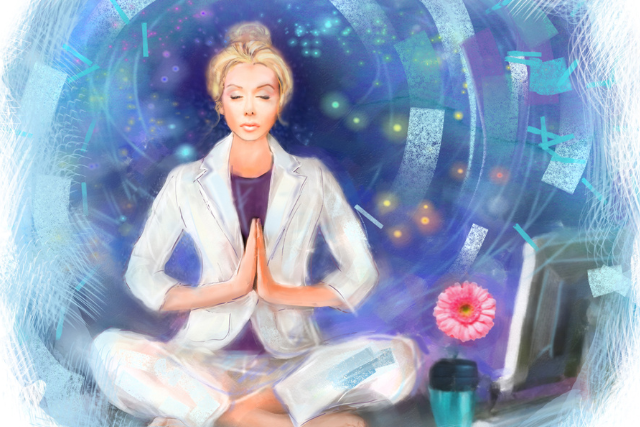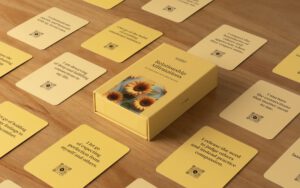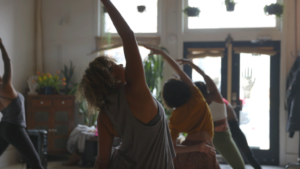The Drawback with Meditating to Develop into Extra Productive


“Stress is brought on by being ‘right here’ however eager to be ‘there,’ or being within the current however eager to be sooner or later.” ~Eckhart Tolle, The Energy of Now
I began studying yoga and meditation once I was eighteen years previous, within the late nineties, within the automotive storage of one of many few yoga academics in Puerto Rico. I took to it like a duck to water.
By the point I used to be twenty-five, I had spent months on Buddhist silent retreats, dwelling in ashrams within the USA, India, and Burma.
Meditative practices and retreats offered me with nice moments of perception and therapeutic and allowed me to have profound realizations concerning the goodness of my nature, my connectedness to others, and life itself.
They gave me entry to states of knowledge, deep compassion, and loving kindness and introduced me again time and again to the sacredness of the current second. Additionally they helped me heal from a painful consuming dysfunction I suffered from on the time.
I fell in love with the Buddha’s teachings. I went on a pilgrimage a few instances by means of India, visiting the historic websites associated to the Buddha. I additionally went forward and visited Myanmar and Thailand, the place I meditated in temples and met really outstanding academics and practitioners.
One thing concerning the connection between thoughts and physique that I found by means of perception practices, the astounding useful results of focus practices in calming the thoughts and getting some detachment from painful and intrusive ideas, and the therapeutic results of loving-kindness practices had me fascinated with the teachings.
I then went on to get a grasp’s diploma in Buddhist research in order that I might be taught a number of the historical languages and go extra in depth into the historical past and ideas of Buddhism.
But, these experiences typically occurred within the midst of a frenzied way of life. I used to be, at instances, working as a waitress, saving cash in order that I might go on another retreat, or having varied jobs on the facet to finance my research and travels.
It was typically the case that as quickly as I stood up from my cushion or left the retreats, I’d be within the “getting issues finished” mode, going again into an agitated routine—as if the practices had been there to make me extra productive and to catapult me right into a high-performance state, as if the peace was there to assist me accomplish much more.
I bear in mind my college days when, for weeks on finish, I made a decision I wished to meditate for 3 hours a day. I’d rush by means of my day, flip down social invites, and maximize using my time in order that I might get my treasured 180 minutes of silence.
I hope not so many individuals can relate to this, however I bear in mind instances once I would get dwelling, drop the keys on the desk, placed on my meditation alarm clock, sit for sixty minutes, and hop up simply in time for my subsequent appointment. Evidently, there have been many days when these three meditation hours weren’t probably the most peaceable hours of my day.
Granted, I used to be younger and a bit excessive, however this was earlier than the arrival of the smartphone. Thereafter, I’d dash from meditation to test all my messages and notifications, missing the self-discipline or consciousness to present myself area and time to combine issues. This behavior went on properly into my grownup years.
Finally, it began to be the opposite method round. The productive and reaching perspective I had outdoors of meditation durations began to infiltrate my religious follow, and I turned decided and hurried to “attain the last word religious purpose.” (Not fairly positive what that was on the time—perhaps turning into enlightened, or absolutely healed, or no less than in a everlasting state of equipoise… reaching nirvana for those who would have allowed me to dream huge.)
This actually did NOT work very properly. It was like attempting to go down the river by swimming towards the present. Not solely was this not efficient, however it truly turned dangerous—grinding my being right into a worrying, reaching state for hours on finish, guided by a form of FOMO on enlightenment. I’d end some meditations agitated on good days and really overwhelmed on unhealthy ones.
Because it seems, there are lots of good explanation why many religious academics emphasize the significance of letting go of religious agendas in a single’s follow and fascinating with the current second as it’s with out aiming for a future second.
It’s not like I didn’t know this. I had undertaken graduate research on Buddhism and had heard extra religious talks than my mind might ever bear in mind. However I discovered there are superb causes as to why workaholism is taken into account a severe dependancy that’s rampant in industrialized fashionable societies, with some estimates suggesting that 25–30% of the inhabitants suffers from it to a point.
Speaking with the religious buddies I virtually grew up with, I spotted that, in productivity-focused cultures like ours, making a serene way of life the place meditation can happen easefully could be much more daunting than establishing a daily meditation follow.
Curiously, workaholism doesn’t simply check with worthwhile actions relating to at least one’s livelihood. I’ve spoken to loads of colleagues in addition to purchasers who report a giant drive to get issues finished.
I’ve heard it referred to as “exercise dependancy,” and a good friend lately described her exhaustion predicament as having a “religious burnout.” She was meditating often and doing her self-growth actions, listening to inspiring podcasts, and taking part in profound religious workshops, and she or he discovered herself exhausted and confused by all of the extreme enter.
These usually are not simply private dilemmas. If we combine a cocktail of recent economies, digital overload, FOMO-inducing social media, and the necessity for constructive actions to mitigate a number of the main social challenges of our instances, even a number of the most Zen amongst us would possibly find yourself with some extent of an overloaded nervous system that finds it troublesome to decelerate and let go of exercise.
A good friend as soon as stated that he used to meditate to be able to dwell a peaceable life. And after a few years of follow, he now lives a peaceable life to be able to meditate.
I now know that to keep up the calmness and ease of my treasured religious practices, I additionally have to dwell in a method that enables area for peace to come up. It’d appear to be an apparent assertion, however what occurs in all these hours off of the cushion (no less than twenty-three of them for many of us) has a serious affect on the fruits of our meditation follow.
Regardless that meditation can help us in dwelling wholesome and energetic life, the frequent emphasis on elevated productiveness as a profit would possibly lead a few of us to consider that meditation is an exercise that we have to test off our to-do record to be able to get extra finished.
And even when now we have the suitable perspective and understanding of meditation, when the hectic behavior of fixed exercise predominates in our days, letting go of it and permitting for presence and perception is likely to be a difficult course of.
My sense is that the path of presence and stillness is the place our being naturally seeks to go, as if it had been our neurological mandate to show to them. Or maybe it’s the different method round—presence and stillness organically search to go in our path, as if it had been their mandate to manifest themselves in us.
In that sense, meditation shouldn’t be one thing that solely occurs after we focus our consideration in formal meditation. That steadiness of the advantageous artwork of doing and not-doing, of effort and effortlessness, of striving and letting go, and of meditating in stillness and dwelling a serene, real life has now grow to be a extra refined compass for my meditation follow.
I nonetheless meditate every day (largely), however I now be sure that I embrace an excellent little bit of puttering round and slowing down into the rhythms of life.
And, if I’m trustworthy, I must confess to lacking my night meditations occasionally for an excellent Netflix indulgence. I’m not fairly positive whether or not this can result in a delay in me getting absolutely liberated, however it positive helps me to finally shut my eyes with extra pleasure once I method extra formal practices.
About Cristina Bonnet Acosta
Cristina Bonnet Acosta is an Natural Intelligence holistic coach. She has a twenty-year background in Buddhism, psychotherapy, and religious growth. She helps her purchasers with cutting-edge approaches to therapeutic which might be each light and efficient. Her work combines a holistic technique that features somatic work, nervous system group, inquiry, spirituality, post-trauma progress, and nurturing care. You possibly can be taught extra about her work and e-book a thirty-min free session at: www.cristinabonnet.com.





